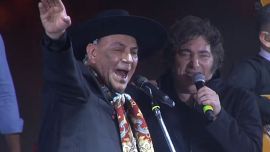Argentines had a political sentiment it seems that no poll could grasp. The overwhelming vote in favour of the opposition virtually settles this year’s presidential election, a bit too early. While it saves the country from a longer and more excruciating competition (initially expected to go all the way to a tight second round run-off in November), it also threatens to make the transition chaotic.
Here’s three lessons that the PASO primaries slapped merciless into the face of Argentina’s political system.
Lesson 1: Pockets win over “souls”
President Mauricio Macri hoped he could get away with promising a better future again, as it did in 2015. But his government has delivered recession in three of its four years, shrinking purchasing power for salaries and pensions due to rampant inflation and a hike in unemployment pushing it into two digits after more than a decade.
The president’s Cabinet chief and campaign manager, Marcos Peña, had said at one point the election would be a battle for “the soul” of Argentines – but Argentines voted en masse with their empty pockets in mind. The government overestimated the public’s underestimation of the economy: in short, macroeconomics has killed micro-messaging.
The economy will now define the thorny transition toward December, as the initial market reaction has indicated. It also exposes, like never before, the flaw of an electoral system that the political establishment has chosen to ignore. Alberto Fernández is now a virtual elected president – but he is not legally one until the vote happens again in October. Technically he is just somebody whose nomination has been confirmed.
Over the next 76 days until October 27, Argentina will have a lame duck president and a (non-)president-elect, who did not even speak to each other on election night. The next Congress will have to change that.
Lesson 2: Cristina’s ‘next best’ was better than Macri’s
Two plus two sometimes makes four, even in politics. Argentina’s electoral scenario has proven to be fairly stable. Macri actually got two percentage points more than in the 2015 primaries (32 vs 30 percent).
But the big change was Cristina Fernández de Kirchner’s decision to step aside and into the vice-presidential slot and Alberto Fernández’s urge to incorporate Sergio Massa into their coalition. This move brought back to the Peronist opposition the votes it had lost due to its own division in 2015. Once pitching the “third way,” Massa bagged 20 percent of the votes four years ago – now Roberto Lavagna only got eight. The breakdown of the vote was surprisingly steady – it’s the electoral offer that made the difference.
“Politics is the art of the possible, the next best,” Otto von Bismarck once said. CFK’s next best proved to be much better than Macri’s. The incorporation of the Peronist Miguel Ángel Pichetto brought some short-term market peace but contributed no votes – he even lost in the school where he voted in his home-province of Río Negro.
The president never believed in opening up his government: the Pichetto move was simply too little too late.
Lesson 3: It is difficult to govern Argentina
Not that we did not know this already, but this is a lesson from the past and – for the next government – a lesson for the immediate future too.
President Macri took over in 2015 with a riddle that was difficult to solve (a stagnant economy, the “cepo” currency restrictions, an international legal battle with debt hold-outs) but made it much worse along the way. Macri thought that playing by the market’s playbook would suffice in steering Argentina towards so-called normalcy. He was wrong.
By the same token, Alberto Fernández will (most likely) be running a country with many ticking bombs surrounding him. His Peronist coalition is only starting to take shape, and his future relationship with his political patron, Cristina Fernández de Kirchner is a riddle for all the players involved (including themselves).
Fernández was explicit during his closing campaign rally, saying that he would “never ever” again fight with Cristina. The former president would have, however, enormous clout in his administration, and the format of decision-making is yet to be resolved.
Most importantly, they will not have a lot of time – or public patience – to sort that issue out along the way.






















Comments